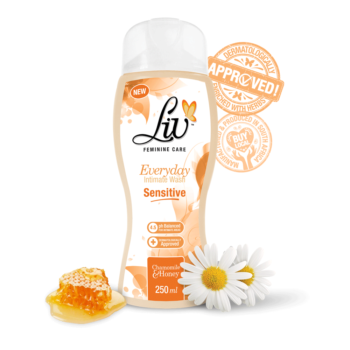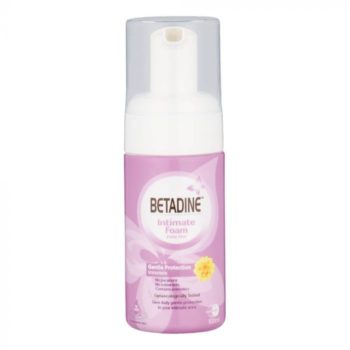You eat right, exercise regularly and take time to calm your mind and sleep well, but what about your vaginal health? Good feminine care can lower your risk of yeast infections and UTIs (urinary tract infections), as well as contribute to pain-free sex, especially in menopausal women.
ALSO SEE: 7 Surprising Perimenopause Symptoms
Daily Care Advice
Don’t use soap
Astringent soaps can destroy the delicate environment of the ‘good’ bacteria in the vagina, which in turn will negatively affect pH. “pH is a number indicating acidity on a scale of 0 (acid) to 14. And, believe it or not, your vagina really does have an optimal pH,” says Dr Lauren Streicher, a clinical associate professor of Obstetrics and Gynaecology at Chicago North-Western University’s Feinberg School of Medicine. “If it’s out of whack, you can develop odour, irritation, and even an infection,” she says.
Try: the pH-balanced Liv Intimate Washes, which are infused with botanical essences, from R65,99 for 250ml, shop.myliv.co.za.

Avoid synthetics
According to gynaecologist Dr Jessica Shepherd, yeast infections thrive in moist, warm places. Sweat and water create this kind of environment in your body. Most gym clothes are made from synthetic fabrics, which keep warmth, humidity and sweat in, so change out of your swimsuit or yoga pants as soon as possible after a workout. For the same reason, use only cotton underwear.
Try: Betadine Daily Intimate Foam, which has no parabens and is colourant free, R49,95 for 100ml, Dis-Chem, for intimate area freshness after a workout.
ALSO SEE: How Old Is Your Body? Plus How To Fix It…

Not all irritation is thrush
When the balance of the vaginal bacteria is altered, it can result in Bacterial Vaginosis (BV), a condition that is characterised by a watery discharge that is greyish in colour, accompanied by a ‘fishy’ odour. BV affects one in three women, and left untreated, can increase the risk of developing a sexually transmitted disease and pelvic inflammatory disease. Visit myvaginalgel.co.za for more information.
Have a wee after sex
Dr Alan B. Copperman, vice-chairman of the department of Obstetrics & Gynaecology at the Icahn School of Medicine at Mount Sinai, explains that with women having a short urethra, there’s a shorter distance for bacteria to travel through the urethra to the bladder. “Sex is often associated with UTIs because sexual intercourse introduces bacteria through the urethra and into a woman’s urinary tract,” he says. Peeing after sex helps flush out bacteria before it can travel to the bladder.
ALSO SEE: 5 Ways to Improve Your Sex Life
Seek professional help
Yeast infections are very common and nothing to be ashamed of. We all get them at one stage or another for a number of reasons. However, should you experience them often, there might be another problem that needs a doctor’s attention. Don’t leave symptoms to worsen, visit your doctor so they can do the necessary tests and treat the issue properly.
Vaginal Rejuvenation Options
1. AQ Skin Solutions Vaginal Rejuvenation System, invented by Immunologist Dr Ahmed Al-Qahtani, uses Growth Factors, which is regenerative medicine that gets your body to start healing itself and produce its own elastin and collagen, as well as control inflammatory processes. Some pre- and post-menopausal women use the system as a substitute for HRT. Visit aqskinsolutionssa.com for a list of South African stockists.
ALSO SEE: Your Best Ever Menopause Beauty Kit
2. Femilift Laser Vaginal Tightening, which makes use of a robotic laser probe to produce uniform and symmetrical muscle tightening, can resolve vaginal laxity, involuntary urine leakage, vaginal dryness and recurring infections. Contact aesthetic gynaecologist Dr Josh Matambo at the Specialist Centre at Linksfield Hospital on 011 485 0251 or [email protected].
By Health Writer, Belinda dos Santos

